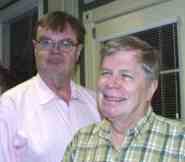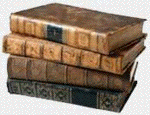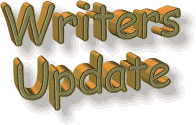
The Bucks County Writers Workshop
Article Archives #3 2003-04
THE MYSTERY OF THE VOYNICH MANUSCRIPT. New analysis of a famously cryptic medieval document suggests that it contains nothing but gibberish. By Gordon Rugg in Scientific American. SURVEY FINDS FEWER NOSES STUCK IN BOOKS. There's been a precipitous downward trend in book consumption by Americans, and a particular decline in reading fiction, poetry, and drama. By Bruce Weber in The New York Times.
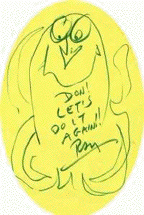
RAY BRADBURY. At the age of 84, Bradbury has published a new story collection, The Cat's Pajamas. The legendary novelist, short story writer, essayist, playwright, screenwriter, and poet was born in Waukegan, Illinois. Ray drew for me the dragon on the left in 1993 and on it writes, "Don, Let's do it again! Ray." I met Bradbury twice for astonishingly revealing interviews about sex and writing, and BOTH can be heard at Wired for Books. These are must-hear, trust me! (Note in the first interview hear gregarius Ray's imitation of film director John Huston, director of Moby Dick, staring Gregory Peck as Captain Ahab, for which Ray wrote the screen play) Ray Bradbury is an American classic.
RICHARD RUSSO, HAPPILY AT HOME IN WINESBURG EAST. Novelist focuses on life in small-town America. By Bruce Weber in The New York Times. 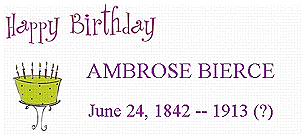
THE AMBROSE BIERCE SITE. Bierce's birthday has come and gone -- but not the mystery over his disappearance in Mexico in 1914. I've posted a new theory about Bierce's death and where he might be buried. It's all hypothetical, but worth thinking about. A retired priest is so certain where Bierce is buried that the former cleric has posted a tombstone on the site. IS DALE PECK GETTING SOME OF HIS OWN? Would-be novelist Dale Peck has savaged some of the great modern writers, but has he gone too far in his latest book, Hatchet Jobs? By Daniel Mendelsohn in The New York Review of Books. NATIONAL REVIEW FOUNDER TO LEAVE STAGE. Conservative pundit and novelist William F. Buckley bows out. By David D. Kirkpatrick in The New York Times. TRAVELING WITH TWAIN IN AN AGE OF SIMULATIONS. Rereading and reliving The Innocents Abroad. By Jeffrey N. Wasserstrom in Common-Place. WRITERS BLOCK. Coleridge was tormented by it, Valery took 20 years off, Rimbaud just gave up. What happens to writers when words won't come? By Joan Acocella in The New Yorker. BAD COMMA. A best-selling book on writing rules is riddled with punctuation errors. Louis Menand in The New Yorker thinks the book may be a hoax. DISSENT GREETS ISAAC BASHEVIS SINGER CENTENNIAL. Not everyone celebrates the Yiddish author, winner of the Nobel Prize. By Alana Newhouse in The New York Times. NOW CHRONICLING SCIENCE FICTION. A museum of science-fiction opens in Seattle. By Kenneth Chang in The New York Times. AA's BIG BOOK ON THE AUCTION BLOCK. Scholars concerned about the upcoming sale of the book that launched Alcoholics Anonymous. By Felicia R. Lee in The New York Times.
GARRISON KEILLOR: AND THE TERRIBLE THINGS RIGHTEOUS PEOPLE CAN DO ...
Photo: Garrison Keillor & Don Swaim 6/12/04Keillor, novelist and former New Yorker staff writer, is host of PRI's "A Prairie Home Companion."
From Garrison Keillor's radio monologue on 6/12/04: Nowadays we're cold-stone sober, cold-stone sober. Lord help us. And the terrible things righteous people can do. God knows, God knows, friends. People without a shred of self doubt. A person without any doubts is a monster. I'm horrified. I'm horrified at the thought that the torture of prisoners is American policy. Just terribly horrified. Say I'm wrong. I hope to be wrong. But I would hate to see enlisted men and women being made scapegoats in order to protect policy-makers. America doesn't stand for torture. It's not who we are. America is a refuge for people who suffer from torture and oppression. If we practice it ourselves what plan does God have for us? You think about all these things, looking down at the graduates of Lake Wobegon High School. Wishing the best for them, how can you not be romantic for them? How could you not? How could you not want to give them the good, sweet country that was given to us? We have a long way to go. -- Hear Don Swaim's interviews with Keillor at Wired for Books.
FOR BUDDING AUTHORS, A RAPID-FIRE PUBLISHER. A New Jersey bookstore will print your manuscript into a perfect-bound paperback in as little as 17 minutes! By Eric A. Taub in The New York Times. WILLIAM MANCHESTER, DEAD AT 82. Some of you may be interested in hearing Don Swaim's 30-minute interview with historian and biographer Manchester, recorded in 1980. In it, Manchester talks about his World War II combat experience. Go to Wired for Books. NEW YORKER FICTION, BY THE NUMBERS. A Princeton student has done a statistical analysis on just what The New Yorker, the nation's most prestigious literary magazine, publishes in terms of short fiction. By David Carr in The New York Times. MALCOLM BOSSE REVISITED. Some may recall the novels of the late Malcolm Bosse -- twenty-two of them -- including his best-known, The Warlord. Recently, I spotted an early novel of Malcolm's at a used bookstore in Lambertville, NJ, which inspired me to post a short appreciation. Malcolm's last wife writes to Wired for Books: "Hi, I am Malcolm Bosse's widow (third wife) and just wanted to thank Don Swaim for the nice write up that I recently found on the web about their adventures together. Please pass along my thanks and best wishes to Don, on Malcolm's behalf. Lori Mack Bosse" BOOKSTORE OWNER'S LABOR OF LOVE IS RECIPROCATED. Beverley Potter's The Title Page bookstore in Rosemont, PA (near Bryn Mawr, Delaware County), is a haven for those seeking rare and used books. by Wendy Walker in The Philadelphia Inquirer. THE I's HAVE IT. At 72, John Updike Still Hasn't Run Out Of Things to Write About. By Linton Weeks in The Washington Post. Hear Don Swaim's own interview with Updike at Wired for Books. PUTTING REGION IN YOUR FICTION. Advice from Seattle about distilling the essence of region in a novel. (Apply the tips to your own part of the country.) By Ryan Boudinot at thestranger.com. TWO BOYHOOD FRIENDS INVENT BEST SELLER FROM RENAISSANCE TALE. A book printed in Venice in 1499 is so irreducible no one knows completely what it's about or even who wrote it. But two young pals have published a novel that "solves" the puzzle. By Dinitia Smith in The New York Times. BUSH SUPPORTERS DISRUPT COMMENCEMENT ADDRESS BY E.L. DOCTOROW. Celebrated author of Ragtime booed for criticizing Bush. One Bush backer said, "In Florida we would have taken him (Doctorow) out ..." By Bart Jones in New York Newsday. Listen to Don Swaim's interview with Doctorow at Wired for Books. JOURNALISTIC COURAGE. George W. Bush calls Seymour Hersh a liar (look who's talkin'), but the muckraking reporter continues to score scoops and embarrass the politicians with stories such as the atrocities committed by Bush's military at Abu Ghraib. By David Carr in The New York Times. DARK DAYS IN NEW ORLEANS AS ANNE RICE GOES SUBURBAN. Rice has moved to the suburbs and put her Garden District home, a near-sacred site to her fans, on the market for $3.75 million. By Andrew Jacobs in The New York Times. Listen to Don Swaim's interview with Anne Rice at Wired for Books. DIVORCE THAT BOOK!. Why subject yourself to an irksome book when so many sublime ones are available? By Laura Miller in The New York Times. SEARCHING FOR EARLY AMERICAN EROTICA. So you thought our long ago ancestors weren't sexy in words or art? Think again. By Karen A. Sherry in Common-Place. Note: This article is based on Sherry's research at Delaware's Winterhur Museum, Garden, and Library. Warning: this site contains sexually explicit images. SIGNATURE COLLECTION. OK, you wrote a book, but how many times can you stand to write your name? By Lawrence Block in The Village Voice. Listen to Don Swaim's interview with Lawrence Block in RealAudio at Wired for Books. BUTTERFLIES & OTHER BITS OF NABOKOV'S LIFE DISPERSED. The memorabilia collection of the author of Lolita is being sold by his son, Dimitri. By Lila Azam Zanganeh in The New York Times. Listen to Don Swaim's interview with Dimitri Nabokov at Wired for Books. PHILADELPHIA STORIES. Fiction, poetry,essays by Delaware Valley area writers. Distributed free at area bookstores and cafes. An online version to start in September. Note the guidlines relative to formatting and proofing. Same as ours!. WILLIAM FAULKNER ON HORSEBACK. The great author had some eccentric habits -- and never read his mail except to see if it had a check inside. By Javier Marias in The Threepenny Review. PATRICIA HIGHSMITH IS HOT. Once belittled as a "dime-store Dostoyevsky," she's now being canonized as a major American artist. By Leonard Cassuto in The Chronicle Review. And listen to Don Swaim's interview with Highsmith at Wired for Books NEW LOLITA SCANDAL. Did Nabokov lift the plot of his classic novel from a 1916 German story? By Ron Rosenbaum in The New York Observer. HOW DOES WOODWARD DO IT?. Research is almost as important for a fiction writer as for a non-fiction writer, such as the Washington Post's Bob Woodward. How does he get the access -- and can we learn from his success? By Danna Harman in The Christian Science Monitor. Yet Woodward's techniques are criticized in this article by Harry Levins in THE KANSAS CITY STAR. NO HOLLYWOOD ENDING FOR F. SCOTT FITZGERALD. A newly sold cache of Fitzgerald manuscripts sheds new light on Scott's last days in Hollywood as the ill-fated genius failed to beat the studio system. By Charles McGrath in The New York Times. WRITERS: NEUROTIC OR SIMPLY CRAZY?. Can wanting to write be traced to brain abnormality? By Joseph Epstein in Commentary. AMAZON'S ON-LINE BOOK REVIEWS. ARE THEY, REALLY?. Still More about Amazon's on-line reviews. By James Marcus in the Washington Post. THE LITTLE DRUMMER BOY. Spy novelist John Le Carrre taken to task for "a lack of depth." By James Wood in The New Republic. COLORFUL NEWS WRITING? TRY 1923. Fiction writers can learn from some of the great newspaper writing of the past. By Peter Roy Clark at The Poynter Institute. MINNESOTA ZEN MASTER. Profile of Garrison Keillor, who believes one can still have friends who are Republicans. By Nicholas Wroe in The Guardian (UK). Hear Don Swaim's own interview with Keillor at Wired for Books. BCWW SUMMER WRITING PROJECT. Here are the details -- as a pdf file -- of the workshop's annual project. Based on a charming O. Henry story. For registered workshop members only. To read the story go to The Marry Month of May JACK KEROUAC SLEPT HERE. Orlando, Florida's, first and only literary landmark is now attracting writers-in-residence. By Abby Goodnough in The New York Times. SEARCH FOR TOMORROW. How Google has changed our world. By Joel Achenbach in The Washington Post. POOR WRITING SKILLS CATCH UP WITH A PHILADELPHIA LAWYER. A federal judge reduces a lawyer's request for fees because his filings were infested with typographical errors. By Adam Liptak in The New York Times. MORE COMPANIES THAN EVER ARE WILLING TO GET YOUR BOOK OUT. Borders is the latest traditional bookseller or publisher to branch into self-publishing using print-on-demand or P.O.D. technology. By Gayle Feldman in The New York Times. CRIMINAL EDITING OF THE ENEMY. Treasury Department may charge as criminals American publishers who edit books from nations deemed enemies by Bush Administration. By Adam Liptak in The New York Times. THE ACCIDENTAL LITERARY STAR. Reclusive author Anne Tyler refuses interviews -- but answers a few questions by email. By Mel Gussow in The New York Times. AMAZON GLITCH UNMASKS WAR OF REVIEWERS. A glimpse at who REALLY writes those anonymous book reviews on Amazon.com. By Amy Harmon in The New York Times. PURGING THE COLON FROM BOOK TITLES. Rare is the academic title that's not lashed to its subtitle by a colon. By Jennifer Jacobson in The Chronicle of Higher Education. SMILEY'S (ANTI-AMERICAN) PEOPLE. John Le Carre's new novel, Absolute Friends, reflects a little discussed secret: the British hate Americans. The Brits ridicule American accents, culture, intellect, and Evelyn Waugh once called us cowards. By Geoffrey Wheatcroft in The New York Times. PS. Paul Theroux's book, The Kingdom By the Sea, holds a mirror up to the Brits' own failings, showing them to be petty, racist, anti-Semitic, and delusional about their own place in the world, which is why so many of them flee their damp, gloomy homeland. Theroux: "Once, from behind a closed door, I heard an Englishwoman exclaim with real pleasure, 'They are funny, the Yanks!' And I crept away and laughed to think that an English person was saying such a thing. And I thought: They wallpaper their ceilings! They put little knitted bobble-hats on their soft-boiled eggs to keep them warm! They don't give you bags in supermarkets! They say sorry when you step on their toes! Their government makes them get a hundred-dollar license every year for watching television! They issue drivers' licenses that are valid for thirty or forty years -- mine expires in the year 2011! They charge you for matches when you buy cigarettes! They drive on the left! They spy for the Russians! They say 'nigger' and 'Jewboy' without flenching! They call their houses Holmleigh and Sparrow View! They sunbathe in their underwear! They don't say 'You're welcome'! They still have milk bottles and milkmen, and junk-dealers with horse-drawn wagons! They love candy and Lucozade and leftovers called bubble-and-squeak! They live in Barking and Dorking and Shellow Bowells! They have amazing names, like Mr. Eatwell and Lady Inkpen and Major Twaddle and Miss Tosh! And they think we're funny?"ZERO TOLERANCE APPROACH TO PUNCTUATION. An unexpected best-seller in the U.K. by nitpicking, fussbudget author Lynne Truss will be published in America in April. It's aimed at people who "don't know their apostrophe from their elbow." By Sarah Lyall in The New York Times.
THE END MATTER. I wanted to share this brilliant review of the 15th edition of The Chicago Manual of Style, published in The New Yorker last October. However, there seemed to be no way to get it online, so I scanned it (for our use only). This is of particular interest to those of us who care about editing our copy. While the article focuses on academic writing, it's also applicable to what we do, and points out the various inconsistencies in the editing process. Additionally, it blasts cheesy Microsoft Word -- which I used to spellcheck this piece, and just when I got to the last paragraph Word crashed for no apparent reasion, making me start over from scratch. By Louis Menand in The New Yorker. BUZZWORDS. The words coined in 2003 from A-Z (there are some in this list I overlooked). By Tom Kuntz in The New York Times. ANGER MANAGEMENT. How the politicians are using each other's vitrol to win votes. By linguist Geoffrey Nunberg in The New York Times. HATCHET MAN. Critic and apprentice novelist Dale Peck is the scourge of literary America. Should anyone care what this guy thinks about anything? By Kate Kellaway in The Observer. (UK) BLOOM HOWLS, KING SHINES. Eccentric literary critic Harold Bloom roasts Stephen King for winning a major National Book Foundation Award. Coming to King's defense is Chris Satullo in The Philadelphia Inquirer. AN UMPTEENTH TRANSLATION OF 'DON QUIXOTE. Is a new translation of "the sloppiest masterpiece" necessary? Yes, says Ian Garrick Mason in Canada's National Post. SCHOLARS OF TWANG TRACK THE Y'ALLS IN TEXAS. By Ralph Blumenthal in The New York Times. JOHN UPDIKE, ANTI-SEMITE?. Don't be ridiculous. By Timothy Noah in Slate. TALL TALES ON THE HIGH SEAS. Patrick O'Brian and C.S. Forester are celebrated for their British naval adventures -- but, astonishingly, both men lied about their own lives. By Jeet Heer in The National Post. CONSERVATIVE CONNECTIONS PUT NOVELIST ON BEST-SELLER LIST. The literary critics think Joel Rosenberg's novels are junk, but his contacts in the world of right-wing punditry have made his books best-sellers.By David Rosenbaum in The New York Times. GARRISON KEILLOR REMEMBERS GEORGE PLIMPTON. Well worth reading. And scroll below to go to Don's interview with Plimpton.
